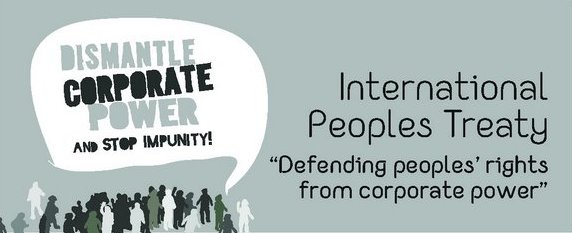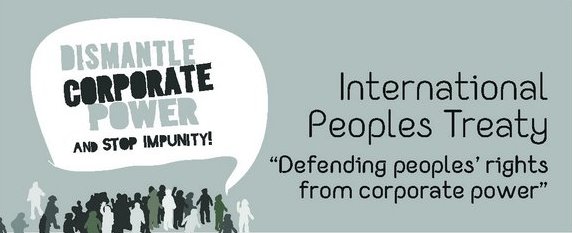Demands increase for international mechanisms to punish transnational corporations’ crimes

 Geneva (Switzerland), Bali (Indonesia) December 3, 2013 – Social movements, networks and organizations from the Global Campaign to Dismantle Corporate Power and Stop Impunity – who protested today in Bali and in Geneva against the corporate capture of the World Trade Organization (WTO) trade negotiations and the United Nations (UN) Human Rights system – are demanding binding regulations to punish corporate crimes.
Geneva (Switzerland), Bali (Indonesia) December 3, 2013 – Social movements, networks and organizations from the Global Campaign to Dismantle Corporate Power and Stop Impunity – who protested today in Bali and in Geneva against the corporate capture of the World Trade Organization (WTO) trade negotiations and the United Nations (UN) Human Rights system – are demanding binding regulations to punish corporate crimes.
“Today in Bali, as governments gather for the WTO Ministerial negotiations, hundreds of activists from around the world are taking to the streets to denounce the free trade system that has facilitated corporate profit while undermining laws that protect environmental and human rights from corporate abuse,” said Lyda Fernanda from the Transnational Institute. She continued saying that “people have shown that there are real alternatives, and have expressed the need for binding regulations instead of more destructive trade deals and corporate collusion with governments and institutions.”
As well as dominating trade negotiations, corporations have also succeeded in capturing the UN Business and Human Rights Forum which takes place from 2 to 4 December in Geneva. Several Transnational Corporations (TNCs) such as Vale, Rio Tinto, Barrick Gold Corporation and others are not only actively participating, but are working with the UN to maintain voluntary guidelines based on Corporate Social Responsibility (CSR), that are not designed to stop or punish human rights violations by TNCs. “These are non-binding norms, that have no enforcement mechanisms and are based on TNCs own reporting of their supposedly responsible performance, while corporate crimes and human rights abuses are systematic, as shown in the Rana Plaza (Bangladesh) and Marikana (South Africa) tragedies” said Juan Hernandez from Hegoa Institute, Basque Country, as he joined the demonstration in front of the Palais des Nations in Geneva. “CSR and non-binding codes have allowed corporations to operate with impunity. For decades, TNCs lobby on the institutions of the Human Rights system continuously dismantled several initiatives to set a binding Treaty and International Court to judge corporate crimes. The abuses that victims are suffering across the globe reaffirm the urgency of such a Treaty and Court” added Professor Hernandez.
To respond to the growing corporate capture of international institutions, social movements, networks and organizations from the Global Campaign to Dismantle Corporate Power and Stop Impunity, are building an International Peoples’ Treaty that “will affirm an alternative vision from the people on law and justice” and in which “the people are the protagonists, political actors and originators of the laws and norms of a political, economic and legal system that will end the current framework of extraordinary privileges and impunity enjoyed by transnational corporations.”
The process for building this Peoples Treaty includes dialogues with several governments who are petitioning to the UN Human Rights Council to institute binding regulations on TNCs. Richard Girard from the Polaris Institute in Canada affirmed that “we will continue mobilizing until these binding norms are in place and until communities and people who have endured corporate crimes are compensated”.
For more information, please contact:
Bali (Indonesia):
Lyda Fernanda (Spanish and English) – lydafernanda@tni.org / +62 082236635857
Brid Brennan (English) – bridbrennan@tni.org
Richard Girard (English and French) – richard@polarisinstitute.org
Geneva (Switzerland):
Diana Aguiar (English, Spanish and Portuguese) – dianaguiar@gmail.com / +41 787985059
Gonzalo Berron (Spanish) – g.berron@gmail.com
Additional resources:
– Stopcorporateimpunity.org
– International Peoples Treaty – “Defending Peoples’ Rights >From Corporate Power”
– Impunity INC: Reflections on the “Super-Rights” and “Super-Powers” of Corporate Capital
